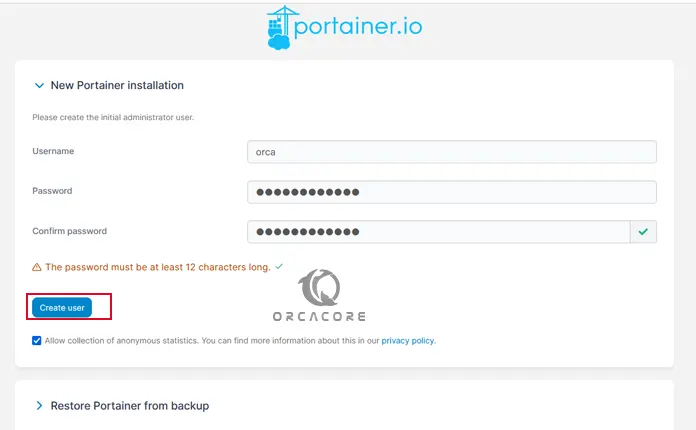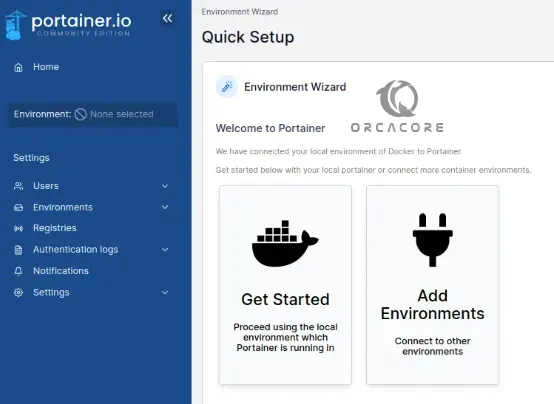Share your love
Install Portainer Docker GUI Tool on AlmaLinux 8

This tutorial intends to teach you to Install the Portainer Docker GUI Tool on AlmaLinux 8.
Portainer is a lightweight management UI that allows you to easily manage your different Docker environments.
Portainer provides an easy and simple solution for managing Docker containers and Swarm services through a web interface. It supports a wide range of features for managing the Docker containers, such as managing the creation and deletion of Swarm services, user authentication, authorizations, connecting, executing commands in the console of running containers, and viewing containers’ logs.
Steps To Install Portainer Docker GUI Tool on AlmaLinux 8
To set up Portainer on AlmaLinux 8, you need some requirements. Let’s see what are.
Note: If you are looking for an installation guide on AlmaLinux 9, you can check this guide on Portainer Installation Setup on AlmaLinux 9.
Requirements
You must log in to your server as a root or non-root user with sudo privileges. To do this, you can follow this guide on Initial Server Setup with AlmaLinux 8.
Then, you must have Docker installed on your server. To do this, you can follow our guide on Install and Use Docker on AlmaLinux 8.
Also, you must have Docker Compose installed on your server. For this purpose, you can visit this guide on Install Docker Compose on AlmaLinux 8.
When you are done, follow the steps below.
Portainer Installation on AlmaLinux 8
At this point, you can start to install Portainer container management on your server.
Create Docker Volume For Portainer
First, you need to create a volume to store Portainer data. Docker volumes are file systems mounted on Docker containers to preserve data generated by the running container. To do this, run the command below:
docker volume create dataThen, verify it by using the command below:
docker volume lsOutput
DRIVER VOLUME NAME
local dataDownload and Run Portainer Docker Image
Now you can use the following command to download and run the Portainer docker image on AlmaLinux 8:
docker run -d -p 8000:8000 -p 9000:9000 --name=portainer --restart=always -v /var/run/docker.sock:/var/run/docker.sock -v data:/data portainer/portainerOutput
latest: Pulling from portainer/portainer
772227786281: Pull complete
96fd13befc87: Pull complete
0bad1d247b5b: Pull complete
b5d1b01b1d39: Pull complete
Digest: sha256:47b064434edf437badf7337e516e07f64477485c8ecc663ddabbe824b20c672d
Status: Downloaded newer image for portainer/portainer:latest
780d7a389480c7a7d30401222d86ca7ce03b7c1d875825f49f50c8eb9accfa76
Check Portainer Status
Next, check your Portainer status with the following command:
docker psOutput
CONTAINER ID IMAGE COMMAND CREATED STATUS PORTS NAMES
780d7a389480 portainer/portainer "/portainer" 20 seconds ago Up 19 seconds 0.0.0.0:8000->8000/tcp, :::8000->8000/tcp, 0.0.0.0:9000->9000/tcp, :::9000->9000/tcp, 9443/tcp portainerAccess Portainer Docker GUI on AlmaLinux 8
At this point, your Portainer Docker GUI is running on port 9000 on AlmaLinux 8. You can access it through the web interface by typing your server’s IP address in your web browser followed by 9000:
http://your-server-ip:9000In the first screen, you should create the initial administrator user.

Then, you will see your Portainer dashboard.

The Dashboard page gives you a glance at your operational environment with important statistics. You can click on each of the components in the dashboard to get more info regarding a specific component.
Conclusion
At this point, you have learned to Install the Portainer Docker GUI Tool on AlmaLinux 8.
For more guides and articles, you can visit the orcacore blog page.



